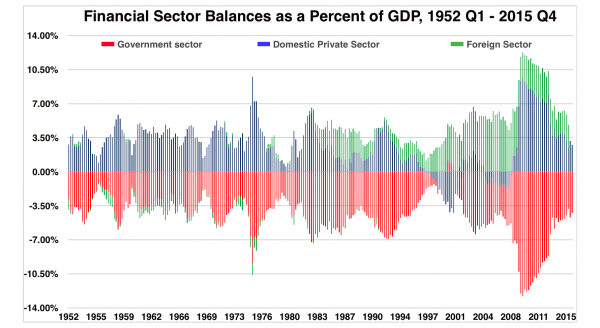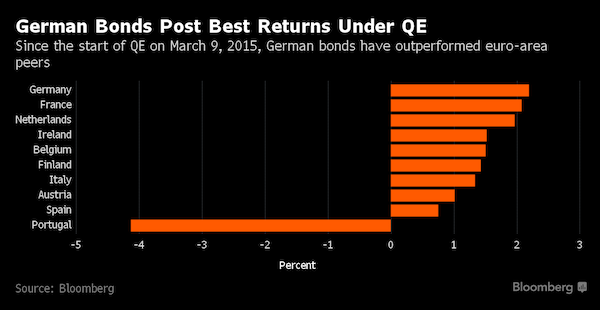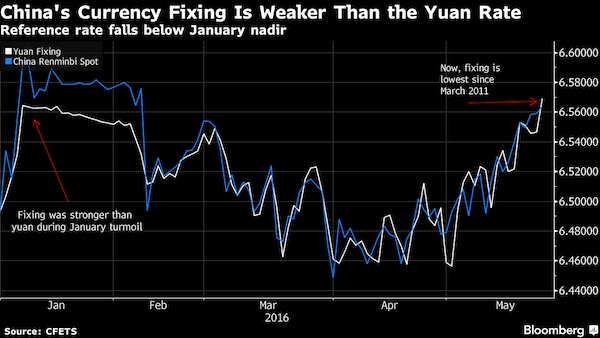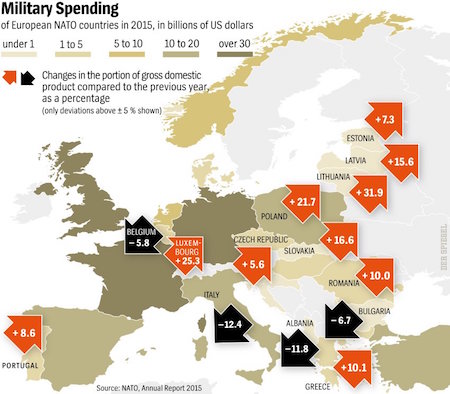
Alfred Palmer Conversion. Beverage containers to aviation oxygen cylinders 1942



Very interesting, and a pity I don’t have more space here. Do read the original. Steve Keen has been saying the same thing about deficits and surpluses for a long time. A government surplus means a deficit for everyone else.
• Hillary Clinton Loves To Trumpet Bill’s Budget Surplus. She Shouldn’t. (Week)
[Bill] Clinton’s budget surplus wasn’t everything it’s cracked up to be. In fact, it might have hurt the economy pretty badly. The key to understanding why rests with an underappreciated economic tool called “sectoral balances” analysis. As Eric Tymoigne — an economics professor as Lewis and Clark College in Portland — explained to The Week, it’s incredibly useful for understanding macro-economic trends. Let’s walk through how it works. A sectoral balances analysis starts with the recognition that the U.S. economy, like any national economy, is roughly comprised of three sectors.
There’s the government sector: the federal government, the Federal Reserve, and the state and local governments. There’s the private domestic sector: individuals, households, businesses, the banks, all the major industries, etc. And then there’s the foreign sector: i.e. the rest of the world, or every entity outside the U.S. national border that we trade with. Each of these three sectors are in a state of surplus or deficit at any given moment. The government is either taxing more than it spends (surplus) or spending more than it taxes (deficit). Households and businesses in the private domestic sector are either saving more than they’re spending (surplus) or vice versa (deficit). And the rest of the world is either exporting more to America than it imports (surplus), or importing from the U.S. more than it exports (deficit). (Perhaps confusingly, the foreign sector balance is the inverse of the U.S. trade balance; i.e. a surplus in the foreign sector actually means a U.S. trade deficit.)
And because of the way we calculate GDP, the sum of the deficits or surpluses of these three sectors will always be zero. So if the domestic private sector is running a surplus of 4% of GDP, for instance, then the government and foreign sectors might each run a deficit of 2%. You can see how this works in the real world in the graph below, which was provided by Scott Fullwiler, an economics professor at Wartburg College. The government sector is in red, the private domestic sector is in blue, and the foreign sector is in green:

As you can see, the government sector has almost always been in deficit since the mid-20th century while the private sector has almost always been in surplus. But what do you notice about the late 1990s? Something weird happened: The private domestic sector (the blue bars) went into deficit for the first time since 1952. Then it did it again in the second half of the 2000s. There’s no way for the spending of private households and businesses to collectively outpace saving unless its being driven by unsustainable debt. So what we’re seeing here is the stock bubble of the late ’90s, which burst in 2001, and the out-of-control mortgages and household debt of the mid-to-late ’00s, which culminated in the 2008 financial crisis. The graph also illustrates why the persistent foreign sector surplus (which, remember, means a U.S. trade deficit) that opened up in the 1990s is such a problem: It must be balanced by either a government sector deficit or a private domestic sector deficit.

A.k.a. zombie money.
• Jeff Gundlach Says US Stock Market Is ‘Dead Money’ (R.)
Jeffrey Gundlach, the chief executive officer of DoubleLine Capital, said on Tuesday that the rally in U.S. stocks, which began on Monday, feels like a short squeeze and characterized U.S. stocks as “dead money.” “The market is not incredibly healthy,” Gundlach said in a telephone interview, noting recent corporate earnings have come in weak. Gundlach, who oversees $95 billion at Los Angeles-based DoubleLine, said the S&P 500 index .SPX “has gone nowhere in the past 12 months to 18 months.” On the Federal Reserve, Gundlach said it is still 50/50 odds that the U.S. central bank will raise interest rates in June. He said many Fed officials are “dying to raise rates,” but that it is Fed chair Janet Yellen’s opinion that matters the most.
“All that matters is Yellen. She is still there. I feel like we are back in December again, where everyone thinks that there is a super secret that some Fed officials have this knowledge that the economy is really good.” Last week, New York Federal Reserve President William Dudley said the U.S. economy could be strong enough to warrant an interest rate increase in June or July, reinforcing the drum beat from within the Fed in recent days that rate increases are coming soon. A range of policymakers with normally varying views on monetary policy are now stating a rate increase is possible at the next policy meeting in June.

They -yet again- found a way to offer debt relief without offering debt relief. Only in 2018, and only ‘if necessary’. It never will be, the numbers will be spun to make sure of that. Greece will ‘receive’ money next month that will go straight to the ECB, and for which taxes have been raised once again, a move that will shrink the economy even more. Just two days ago, the IMF called for ‘unconditional’ debt relief. That is not what this is: ‘if necessary’ is a condition.
• Eurozone Hails ‘Breakthrough’ With Greece, IMF Debt Deal (R.)
The euro zone gave Greece its firmest offer yet of debt relief in what finance ministers called a breakthrough deal that won a commitment from the IMF finally to return to taking part in the bailout for Athens. After talks that lasted into the small hours of Wednesday, the Eurogroup ministers gave a nod to releasing €10.3 billion in new funds for Greece in recognition of painful fiscal reforms pushed through by Prime Minister Alexis Tsipras’s leftist-led coalition, subject to some final technical tweaks. But a bigger step forward was a deal by which the euro zone agreed to offer Athens debt relief in 2018 if that is necessary to meet agreed criteria on its payments burden. That was enough to secure an agreement from the IMF to again join the euro zone in funding the bailout of Greece.
“We achieved a major breakthrough on Greece which enables us to enter a new phase in the Greek financial assistance programme,” Eurogroup President Jeroen Dijsselbloem, the Dutch finance minister, told a news conference. “This is stretching what I thought would have been possible not so long ago.” Acknowledging the “political capital” European ministers invested to reach the deal – a nod to strong German objections to debt relief – Dijsselbloem called it a “new phase” in a six-year drama to stabilise Greece’s finances that has taken the 16-year-old euro zone to the brink of break-up. Mutual trust was returning to the talks, he said, nearly a year after Tsipras’s rejection of austerity measures pushed Athens close to be pushed out of the euro.

“Everything is on the table..” “Whenever they meet resistance, they get around it by adjusting the rules..” “They are basically building the boat in the open sea..”
• Draghi Running Out Of Options After Draining Bond Market by $800 Billion (BBG)
The biggest buyer of European government bonds may have to start spreading its money around a bit more widely. The ECB expanded the size of its debt-buying program in April by a third to €80 billion a month and appears to be running out of securities eligible under its own rules. Monetary policy makers increased purchases of Irish and Portuguese bonds last month by less than it did for German debt, suggesting demand already threatens to outstrip supply from some countries. Banks say it might have to include more bonds or risk diluting the stimulus to the economy the quantitative easing is designed to inject. “Everything is on the table,” said Richard McGuire at Rabobank. “Whenever they meet resistance, they get around it by adjusting the rules, adjusting the limits or targeting new asset classes.”
Purchases at the moment are based on the size of a country’s economy and there are exclusions linked to debt restructuring. Rabobank estimates €1.13 trillion of bonds currently off limits could be eligible should the ECB change the parameters. The ECB started buying sovereign debt in March last year and has spent more than $800 billion. An ECB spokesman said on Tuesday that the bank is confident the program will continue to be implemented smoothly and it sees no shortage of eligible assets under the current rules. President Mario Draghi said a month ago that there were no plans to make any changes. The securities are acquired through each country’s central bank and broadening the remit would particularly help relieve pressure on Germany. While the country has a lower amount of outstanding debt compared with say Italy, the Bundesbank currently must buy a greater amount because its economy is the largest.
“Germany is definitely affected very much by lack of eligible bonds,” said Daniel Lenz at DZ Bank in Frankfurt. “Outstanding volumes compared to other countries are low and new bond issuances are also low.” German bonds have been the best performers among the 10 largest markets eligible in the ECB program, returning 2.2% over the 14 months of its lifespan. But at today’s pace of bond buying, Germany would exhaust the supply of sovereign bonds by September 2016 or February 2017 if the debt of German regions is included. “They are basically building the boat in the open sea,” McGuire said.


Xi has taken the full reins again of something he does not oversee.
• China Weakens Yuan Fixing to Lowest Since 2011 (BBG)
China’s central bank weakened its currency fixing to the lowest since March 2011 as the dollar strengthened. The reference rate was lowered by 0.3% to 6.5693 per dollar. A gauge of the dollar’s strength rose to a two-month high Tuesday as traders boosted wagers that U.S. interest rates will rise. The yuan weakened 0.1% to 6.5636 in a third day of losses as of 10:27 a.m. in Hong Kong. A resurgent greenback is shaking up a strategy that the People’s Bank of China pursued over the past three months –a steady rate against the dollar, combined with depreciation against other major currencies.
Traders are now pricing in a better-than-even chance of the Federal Reserve boosting borrowing costs by its July meeting, with officials lining up to indicate their willingness to support such a move, should the current strength in the economy be sustained. “It could be because the authorities want to alleviate some of the depreciation pressure before the Fed interest rate decision in June,” said Christy Tan, head of markets strategy at National Australia Bank Ltd. in Hong Kong. “If there are signs of panic dollar buying, the PBOC will step in.”


Sometimes you get the impression they actually believe they can control world markets. They’ll find out.
• China Says It Has Conquered Commodities Trading Frenzy (BBG)
China’s leading market regulator said that its clampdown on speculation in raw materials futures has successfully reined in the frenzy, and pledged to beef up oversight as the country seeks to dislodge rivals and become the global center for commodities pricing. “Recently, we experienced huge volatility and trading volumes in some commodity futures,” Fang Xinghai, vice chairman of China Securities Regulatory Commission, said at the Shanghai Futures Exchange’s annual conference in the city on Wednesday. “We supervised the exchanges to take measures, which have seen a notable effect.” Raw-material markets in Asia’s top economy were seized by a speculative frenzy in March and April that spurred a rapid run-up in prices and unprecedented volumes.
The outburst prompted a crackdown from the CSRC and exchanges, which tightened rules and raised fees to discourage the surge amid concern it was excessive and could jeopardize efforts to cut back excess industrial capacity. For China to now expand its role as a global pricing center, effective supervision is critical, according to Fang. “We’re facing a chance of a lifetime to become a global pricing center for commodities,” Fang told the audience in China’s commercial capital. “On the way to realize this goal, we’ll see very intense competition. We have the advantage of trading size and economic growth, but our legislation is still not sound and we lack enough talent.”
China is the world’s largest user of metals and energy, but its traders and companies rely on financial centers outside the country to set benchmark prices for the commodities they handle and consume. While raw materials trading in the nation remains largely off-limits to overseas investors, who also face currency restrictions, China has long pledged to open up. “We plan to use crude oil, iron ore and natural-rubber futures as the starting point in our efforts to open the domestic market to more foreign investors,” said Fang. “To become global pricing centers for commodities, we need appropriate and effective supervision measures.” He added: “According to our experience, the challenge for supervisors is not systematic financial risks from bringing in foreign participants, but rather the challenge is to prevent non-compliant trading by individuals with technical advantages.”

Follow up to the “we can control world markets” article above.
• New York, London on Notice as China Targets Commodities Pricing (BBG)
China has put the world’s traditional financial centers on notice that it wants to develop its raw material markets as hubs for setting prices, seeking to marry the country’s commercial heft with a much greater say in determining how much commodities cost. “We’re facing a chance of a lifetime to become a global pricing center for commodities,” Fang Xinghai, vice chairman of the China Securities Regulatory Commission, said at the Shanghai Futures Exchange’s annual conference in the city on Wednesday. “On the way to realize this goal, we’ll see very intense competition. We have the advantage of trading size and economic growth, but our legislation is still not sound and we lack enough talent.”
China is the world’s largest user of metals and energy, but its traders and companies rely on financial centers outside the country – typically London and New York – to set benchmark prices for most of the commodities they handle and consume. While raw materials trading in the nation remains largely off-limits to overseas investors – who also face currency restrictions – China has long pledged to open up. Fang vowed to press on with that process, while also seeing tough challenges from rival centers as it does so. “We plan to use crude oil, iron ore and natural rubber futures as the starting point in our efforts to open the domestic market to more foreign investors,” Fang told the audience. China shouldn’t underestimate “the determination of current pricing centers to maintain their status,” he said.
Raw-material futures markets in Asia’s top economy became a focal point earlier this year after being engulfed in a speculative frenzy, with a rapid run-up in prices and unprecedented volumes in March and April. The outburst prompted a crackdown from the CSRC and exchanges, which tightened rules and raised fees. The intervention was successful, and for China to now expand its role as a global center, effective supervision is critical, according to Fang. “Recently, we experienced huge volatility and trading volumes in some commodity futures,” said Fang. “We supervised the exchanges to take measures, which have seen a notable effect.”

If you ask me, it’s pretty out there, period, to have banks fund one side of the referendum. Who does he think he’s fooling.
• Mark Carney Denies Brexit Bias And Goldman Influence (BBG)
“Wow.” That was how Bank of England Governor Mark Carney responded to a query about whether his former employer, Goldman Sachs, had encouraged him to warn on the risks of the U.K. leaving the European Union. The question came from Conservative lawmaker Steve Baker, a self-confessed critic of the central bank, who noted that Goldman, where Carney worked for 13 years until 2003, has been a contributor to the Remain campaign. “Can I just give you the opportunity to refute any suggestion that Goldman Sachs may have put pressure on you?” Baker asked during the testimony, which lasted more than two hours and was dominated by Brexit. As Carney answered, sitting beside him was another Goldman alum, BOE Deputy Governor Ben Broadbent, who shook his head.
The governor’s full response was: “I refute it categorically and I am stunned to even have it raised.” Baker’s questioning followed a lengthy grilling from pro-Brexit lawmaker Jacob Rees-Mogg, who questioned Carney’s independence from government and said he’s dishing out the “same propaganda” as the Treasury. The governor was quick to reply: “I don’t accept that at all.” These comments on the referendum implications were probably Carney’s last, as a pre-vote purdah period begins this week. While he’s due to give a big speech in June, he plans to stay away from EU-related topics. He also acknowledged he can’t win when it comes to his commentary. “All we can do is just call the economics as we see them and our words and analysis will be used by both sides. That’s fair game.”

How little we know. Long but worth a read.
• Your Brain Does Not Process Information And It Is Not A Computer (Aeon)
No matter how hard they try, brain scientists and cognitive psychologists will never find a copy of Beethoven’s 5th Symphony in the brain – or copies of words, pictures, grammatical rules or any other kinds of environmental stimuli. The human brain isn’t really empty, of course. But it does not contain most of the things people think it does – not even simple things such as ‘memories’. Our shoddy thinking about the brain has deep historical roots, but the invention of computers in the 1940s got us especially confused. For more than half a century now, psychologists, linguists, neuroscientists and other experts on human behaviour have been asserting that the human brain works like a computer. To see how vacuous this idea is, consider the brains of babies.
Thanks to evolution, human neonates, like the newborns of all other mammalian species, enter the world prepared to interact with it effectively. A baby’s vision is blurry, but it pays special attention to faces, and is quickly able to identify its mother’s. It prefers the sound of voices to non-speech sounds, and can distinguish one basic speech sound from another. We are, without doubt, built to make social connections. A healthy newborn is also equipped with more than a dozen reflexes – ready-made reactions to certain stimuli that are important for its survival. It turns its head in the direction of something that brushes its cheek and then sucks whatever enters its mouth. It holds its breath when submerged in water. It grasps things placed in its hands so strongly it can nearly support its own weight.
Perhaps most important, newborns come equipped with powerful learning mechanisms that allow them to change rapidly so they can interact increasingly effectively with their world, even if that world is unlike the one their distant ancestors faced. Senses, reflexes and learning mechanisms – this is what we start with, and it is quite a lot, when you think about it. If we lacked any of these capabilities at birth, we would probably have trouble surviving. But here is what we are not born with: information, data, rules, software, knowledge, lexicons, representations, algorithms, programs, models, memories, images, processors, subroutines, encoders, decoders, symbols, or buffers – design elements that allow digital computers to behave somewhat intelligently. Not only are we not born with such things, we also don’t develop them – ever.

There is nothing more dangerous to us than NATO. It has to make up narratives or it will cease to exist.
• NATO Struggles to Recover after Years of Budget Cuts (Spiegel)
RAND Corporation simulations aren’t for the faint of heart. The think tank in Santa Monica, California is a progeny of the Cold War and the 1960 study conducted by legendary systems theorist Herman Kahn — which examined the consequences of nuclear war – has not been forgotten. He believed the aftermath could be managed. Following a nuclear conflict, Kahn proposed, contaminated food should be reserved for the elderly since they would likely die before contracting cancer as a result of radiation. The researcher thus became one of the inspirations for Stanley Kubrick’s film satire “Dr. Strangelove or: How I Learned to Stop Worrying and Love the Bomb. Several weeks ago, the California-based game theorists released another study that received a fair amount of attention.
Financed by the Pentagon, they created a series of simulations for a hypothetical Russian invasion of the two Baltic states of Estonia and Latvia. “The outcome was, bluntly, a disaster for NATO,” the RAND researchers wrote in their report. In each simulation, the Russians were able to either circumvent the outnumbered NATO units, or even worse, destroy them. Between 36 and 60 hours after the beginning of hostilities, Russian troops stood before the gates of Riga or Tallinn – or both. The RAND simulation triggered heated debate. In an article headlined “How I Learned to Stop Worrying and Love NATO’s Crushing Defeat by Russia,” American military expert Michael Kofman questioned strategic parameters used in the simulations. “No one can intelligently articulate the benefits of such potential actions for the Russians,” he wrote.
But the game theorists from Santa Monica aren’t the only ones simulating grim scenarios these days. The Russians are conducting giant military exercises to practice for a war with the West. At the same time, they are reinforcing military units stationed in the exclave of Kaliningrad, located between Poland and Lithuania. NATO in turn intends to station rotating battalions to the Baltic States as a signal to Moscow that the alliance takes its commitment to mutual assistance seriously. Security experts and generals, though, are complaining that such moves are not enough and are pushing for the stationing of larger and – especially – more permanent units on the alliance’s eastern flank.


Money changes everything.
• Logging Of Europe’s Last Primeval Forest Starts Despite Protests (G.)
Poland has started logging in the ancient Bialowieza forest, which includes some of Europe’s last primeval woodland, despite fierce protests from environmental groups battling to save the World Heritage site. “The operation began today,” national forest director Konrad Tomaszewski said of the plan to harvest wood from non-protected areas of one of the last vestiges of the immense forest that once stretched across Europe. He said the goal was “to stop forest degradation” – by combating what the environment ministry says is a spruce bark beetle infestation – and protect tourists and rangers from harm by cutting down trees that risk falling on trails.
But environmental campaigners warn that the tree chopping will destroy an ecosystem unspoiled for more than 10,000 years that is home to the continent’s largest mammal, the European bison, and to its tallest trees. “We’re calling on the European Commission to intervene before the Polish government allows for the irreversible destruction of the Bialowieza forest,” Greenpeace Poland activist Katarzyna Jagiello said in a statement. Campaigners have taken issue with the government rationale for the project, saying the beetle’s presence does not pose any threat to the forest’s ecosystem. “The minister does not understand that this insect is a frequent and natural visitor, that it has always existed and the forest has managed to survive,” Jagiello said.

Our friends in need.
• Turkish Journalist Jailed, Stripped Of Her Parental Rights (Al-M)
Turkish female journalist Arzu Yildiz was this week sentenced to 20 months in prison for her reporting on alleged Turkish arms shipments to Syria, a highly controversial issue that has riled Ankara and landed both journalists and judicial officials in jail. The court, however, did not stop there, and stripped Yildiz also of her parental rights. While the imprisonment of journalists may have become commonplace in Turkey, now ranking 151st on the World Press Freedom Index, the restriction of Yildiz’s parental rights marks a new milestone in the extent the pressure on journalists has reached, affecting even their familial ties and social standing. Yildiz is an experienced journalist who, after working for various media outlets, was left jobless a couple of years ago.
Together with other jobless colleagues, she co-founded the nonprofit Grihat news site, where her reporting on the trucks controversy led to her conviction. The story in question was related to the interception of Syria-bound trucks in the southern provinces of Hatay and Adana in January 2014. Acting on tip-offs, prosecutors had issued search warrants for the trucks. But when stopped by police and gendarmerie officers, the men in the vehicles identified themselves as members of the National Intelligence Organization (MIT) and resisted the searches. President Recep Tayyip Erdogan claimed at the time the trucks carried humanitarian supplies, but few were convinced. All judicial officials and security forces involved in the attempted search are behind bars today.
The Cumhuriyet daily’s Editor-in-Chief Can Dundar and Ankara representative Erdem Gul also found themselves behind bars for their reports on the story. Though they were released three months later, they received jail terms for revealing state secrets earlier this month. Another journalist who covered the issue, Fatih Yagmur, remains on trial. In an interview with Al-Monitor, her lawyer, Alp Deger Tanriverdi, explained what the ruling means. “Let me tell you the most significant part: The ruling strips Arzu Yildiz of her motherhood rights,” he said. “She can no longer register her kids to school, open bank accounts for them or do other similar things on their behalf. She can’t even go abroad with them.”
Asked about the grounds on which the court made the decision, the lawyer said, “The court was [actually] supposed to suspend the sentence because Yildiz had no other conviction before. That was her legal right. Yet the court arbitrarily went ahead on grounds she committed the crime willfully, which automatically brought the decision to strip her from her rights. The court could have withheld this decision as well. Such restrictions are based on the following logic: ‘You’ve committed a crime willfully, so you are guilty before society as well. Thus, you must not be allowed to have a [bad] influence on your children.’ Such is the intention of the clause, yet the court applied it to Yildiz — to humiliate her.”

Really, Europe, this is what the EU stands for? Really? And you can’t see the warning signs?
• Turkey Threatens To Block EU Migration Deal Without Visa-Free Travel (G.)
Recep Tayyip Erdogan has warned the European Union that Turkey would block laws related to the landmark deal to stem the flow of migrants to Europe if Ankara was not granted its key demand of visa-free travel within the bloc. At the close of the World Humanitarian Summit in Istanbul, Turkey’s president said: “If that is not what will happen…no decision and no law in the framework of the readmission agreement will come out of the parliament of the Turkish republic.” Germany’s chancellor Angela Merkel warned after talks with Erdogan on Monday that the target of the end of this month to agree visa-free travel for Turks was unlikely to be met. The agreement, which is already being implemented, saw Turkey pledge to work to stop migrants cross the Aegean to Europe and also re-admit migrants who crossed illegally.
EU officials have hailed the success of the deal, but Ankara has grown increasingly uneasy about the bloc’s wariness to grant it the visa-free travel to the passport-free Schengen area it was offered in return. Erdogan also complained about the EU’s wariness in handing over to Turkey a promise of €3bn followed by another €3bn to help Syrian refugees. “Turkey is not asking for favours – what we want is honesty,” Erdogan said in an angry tirade that overshadowed the end of the summit. “Turkey is supposed to fulfil criteria? What criteria are these I ask you?” EU leaders are insisting that Turkey abides by 72 conditions before the visa exemption takes place, with a demand to change counter-terror laws proving particularly contentious. The EU wants Ankara to narrow its definition of terror to stop prosecuting academics and journalists for publishing “terror propaganda”.

Meanwhile, over by the patio door…
• Over 5,600 Refugees Rescued Off Lybia In 2 Days (R/AFP)
Some 3,000 migrants were saved off the Libyan coast in a single day, in 23 separate rescue missions, the Italian coastguard said in a statement. The coastguard said this meant more than 5,600 migrants had been rescued from various boats and dinghies in the southern Mediterranean in just two days. Coastguard boats, vessels from the EU’s naval operation EUNAVFOR Med and its border agency Frontex, a boat from NGO SOS Mediterranee and two tug boats from an offshore oil platform were all involved in the rescue operations. Every search and rescue asset in the area was deployed, the coastguard said.
No breakdown of the nationalities of the people rescued was immediately available. Humanitarian organisations say the sea route between Libya and Italy is now the main route for asylum seekers heading for Europe after an EU deal on migrants with Turkey dramatically slowed the flow of people reaching Greece. Officials fear the numbers trying to make the crossing to Italy will increase as weather conditions continue to improve. Earlier this month, Italy said some 31,000 migrants, mainly from Africa, had reached the country by boat, slightly down on 2015 levels. However, the number of new arrivals has picked up markedly in recent days.








